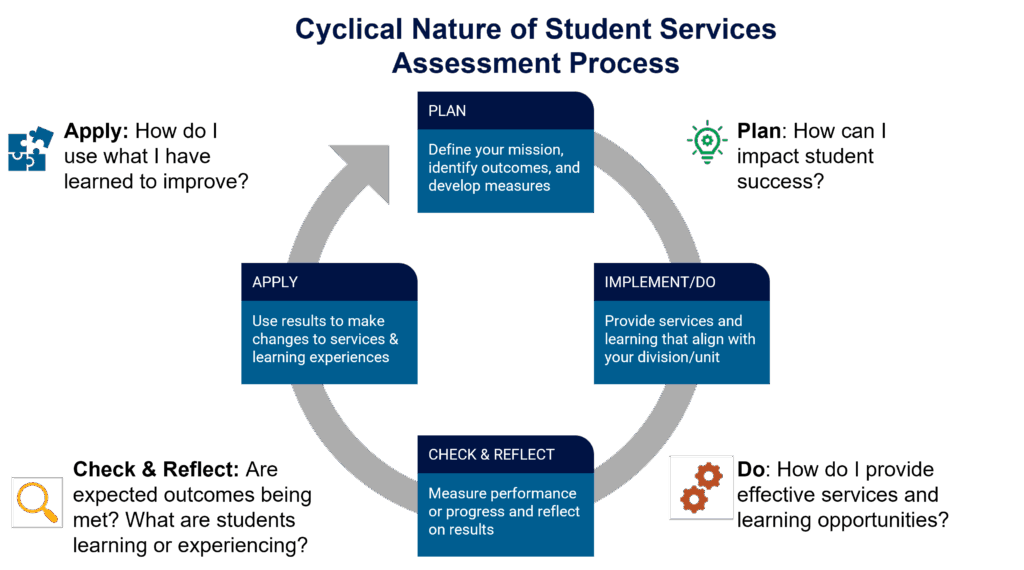Student Services Support
Let’s chat about:
- Assessment processes
- Survey development
- Overcoming challenges
- Engaging stakeholders
- Assessment growing pains
- Assessment document support or feedback
- Summarizing data
- Manageable & meaningful assessment practices
- Orientation to Student Services assessment
- Refining outcomes
- Improving alignment
- Data collection considerations
- Qualtrics support
- Mission statements
- Assessment terminology
- Measurement tools
- And more!
Student Services Assessment Bulletins
General Student Resources
- Pre-submission Check
- Actions for Future Improvement List
- Data Review Worksheet
- Marymount University Administrative Assessment Handbook
- Youngstown State University Co-Curricular Student Learning Outcomes Assessment Handbook
- James Madison University Assessment Skills
- Niloa Website for Those New to Assessment
Frequently Asked Questions
Assessment is a reflective process by which a department or unit reviews and considers the effectiveness of instructional methods, class activities, curriculum, and student engagement by measuring student learning. This process should be informative and meaningful to the faculty and staff engaged in providing instruction in the course or program and should lead to improvements to student learning based on data-informed decision-making.
While we recognize that assessment is a component of institutional compliance with state and regional policies, Georgia Southern values assessment as a critical activity to ensure continuous improvement in the experience of our students.
The goal of your assessment process should be to gain a greater understanding of student learning in your course or program. Keep this focus in mind as you draft student learning outcomes, design assignments for assessment purposes, decide what data are critical to collect and how you will collect it, interpret those data in alignment with student learning outcomes, and use that interpretation to drive action plans to improve student learning.
Your assessment should provide meaningful insights into student learning that can be used to guide future developments of the course or program. As disciplines, pedagogy, and student characteristics change and evolve, you may need to adapt your assessment framework and processes to address those changes and ensure that your process remains meaningful and useful.
The systematic examination of outcomes that define achievement in our courses and degree programs plays a significant role in student success. Your efforts contribute to the intellectual, personal, and professional development of students as we work together to ensure excellence in teaching and learning at Georgia Southern.
When assessment is done in a meaningful way, it is beneficial to students, faculty and staff, Georgia Southern, and our community. The assessment process allows us to continuously seek improvement and make informed decisions for achieving our desired outcomes, goals, and strategic plan.
Georgia Southern students benefit from a broad range of student and academic support units with intentional programming, services, and activities to promote the success of every student. Student Services Outcomes assessment is a reflective process that allows staff working in those areas to determine meaningful outcomes and methods for measuring the effectiveness of those services. If a unit has an educational component, it may adopt student learning outcomes like those used for academic programs or core courses but tailored to the mission and purposes of the specific unit. Other types of metrics may be used to measure effectiveness for units who do not have a focused educational component. Units follow a regular process of collecting data and assessing their chosen outcomes using multiple measures. This data is analyzed, summarized, and used in the development of action plans for future improvement. Student Services Outcomes assessment documents are reviewed in interactive charrettes to generate actionable feedback for the units.

